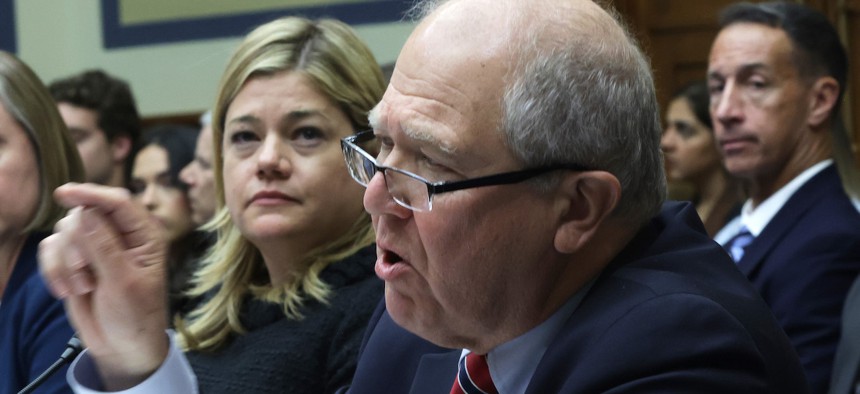
Special Inspector General for Afghanistan Reconstruction John Sopko testifies during a hearing before the House Committee on Oversight and Accountability on April 19, 2023 in Washington, D.C. Alex Wong/Getty Images
Afghanistan Watchdog to Congress: We Need Help Getting Agencies to Cooperate With Us
White House and agency officials argue that the administration has been responsive to the inspector general.
The Afghanistan watchdog asked Congress on Wednesday for help getting the Biden administration to cooperate with its investigations in wake of the U.S. withdrawal and Taliban’s takeover of the country.
In testifying before the House Oversight and Accountability Committee, John Sopko, inspector general for Afghanistan Reconstruction, re-upped its issues with getting access to information and interviews. Last summer, the inspector general for Afghanistan Reconstruction blasted the State Department and U.S. Agency for International Development for “sudden refusal to cooperate,” which they pushed back on. As Government Executive reported last month, problems still persist.
“We need your help to stop this obfuscation and delay” from the State Department and, to a lesser extent, the U.S. Agency for International Development, Sopko testified. “As I’m sure my fellow inspectors general would agree, we cannot abide a situation in which agencies are allowed to pick and choose what information an IG gets or who an IG can interview or what an IG may report on. If permitted to continue, it will end SIGAR’s work in Afghanistan, but also Congress’ access to independent and credible oversight of any administration.”
While U.S. aid continues to flow to Afghanistan, “unfortunately so do many of the problems that SIGAR has identified over the past decade, including problems that led to the collapse of the Afghan government and security forces,” which is compounded by the lack of full cooperation from the agencies, Sopko said in his prepared statement. As a result, the office “on the extent to which our government may be funding the Taliban and other nefarious groups with U.S. taxpayer dollars,” Sopko said in his prepared statement. “More troubling, State and USAID have instructed their employees not to talk to SIGAR, and in one recent instance, State told one of its contractors not to participate in a SIGAR audit.”
Sopko’s concerns were echoed in his office’s fifth high-risk list released in conjunction with the hearing. He also noted in his prepared statement that the office has previously had issues getting information from the Defense Department.
“SIGAR’s audits are an important part of Afghanistan-related oversight,” said a spokesperson for the State Department. “We have raised questions related to SIGAR’s jurisdiction with respect to activities after August 2021,” which “remain unresolved,” said the spokesperson. Sopko pushed back on those jurisdictional challenges last summer.
“Nonetheless, the Department and USAID have provided SIGAR written responses to dozens of questions, as well as thousands of pages of responsive documents, analyses, and spreadsheets describing dozens of programs that were part of the U.S. government’s reconstruction effort in Afghanistan,” said the State Department spokesperson. “We are frequently, regularly working with SIGAR within the scope of its statutory mandate.”
Similarly, a USAID spokesperson stressed their responsiveness and communication with the IG office.
When asked about the alleged stonewalling during the briefing on Wednesday, White House Press Secretary Karine Jean-Pierre said, “the administration has consistently provided updates and information and including…thousands of pages of documents, analysis, spreadsheets and written responses to questions, hundreds of briefings to bipartisan members and also their staff, public congressional testimony by senior officials all while consistently providing updates and information to numerous inspectors general.” Also, ahead of the hearing Ian Sams, special assistant to the president and White House oversight spokesperson, released a statement slamming House Republicans for claiming the Biden administration has not been cooperating.
This issue is something Republicans on the committee have been publicly raising concerns about for a while now, dating back to when they were in the minority.
“This administration not only continues to provide excuses for the self-inflicted humanitarian and national security catastrophe, but senior officials are actively obstructing meaningful congressional oversight,” Rep. James Comer, R-Ky., chair of the oversight committee, said upon announcing the hearing.
Rep. Kweisi Mfume, D-Md., ranking member of committee’s panel on Government Operations and the Federal Workforce, addressing Sopko, said that Congress and particularly, Democrats on the oversight committee in the previous session of Congress, “repeatedly, encouraged and pushed agencies to cooperate with SIGAR,” so he was frustrated to hear the agencies haven’t given their full cooperation. Underscoring what Rep. Jamie Raskin, D-Md., ranking member said earlier in the hearing, “it’s the intention of this committee to always support the work of inspectors general; if we don’t do that then it’s pretty difficult for us to move forward with any sense of legitimacy.”
Amid some partisan swipes during the hearing, members from both parties discussed possibly issuing a joint letter of support for the IG community.
The State, USAID and Defense IGs––also present at the hearing––testified they are not having access issues with the executive branch.







